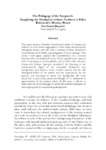Mostrar o rexistro simple do ítem
The Pedagogy of the Sasquatch: Imagining the Aboriginal without Feathers in Eden Robinson’s Monkey Beach
| dc.contributor.author | Darias Beautell, Eva | |
| dc.date.accessioned | 2016-07-15T08:35:31Z | |
| dc.date.available | 2016-07-15T08:35:31Z | |
| dc.date.issued | 2008 | |
| dc.identifier.citation | AEDEAN 2008, 31: 609-617 ISBN-978-84-9749-278-2 | |
| dc.identifier.isbn | 978-84-9749-278-2 | |
| dc.identifier.uri | http://hdl.handle.net/2183/17073 | |
| dc.description.abstract | [Abstract] This paper analyzes Canada’s foundational myths of Nature and Natives vis-à-vis recent negotiations of that same relationship by Aboriginal writers, and will offer a reading of Eden Robinson’s novel Monkey Beach (2000) as paradigmatic of those changes. This novel, I will argue, exposes the contradictions of a colonial discourse that has produced visions of the natural/native space as void of meaning, as claustrophobic, and as filled with unknown threats (the famous “garrison mentality”). By focusing on the culture-specific figure of the Sasquatch, Robinson’s text incorporates and analyzes those colonial notions side by side Aboriginal beliefs of the mythic and the supernatural. In the process, new meanings of nature and aboriginality will come about that contest those previously thought of as traditional or representative of the national ethos. At the same, I will try to show how the novel manages to avoid the common practices of stereotyping and/or essentializing aboriginality. | |
| dc.language.iso | eng | |
| dc.publisher | Universidade da Coruña | |
| dc.title | The Pedagogy of the Sasquatch: Imagining the Aboriginal without Feathers in Eden Robinson’s Monkey Beach | |
| dc.type | info:eu-repo/semantics/conferenceObject | |
| dc.rights.access | info:eu-repo/semantics/openAccess |






